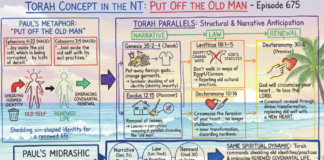This week’s reading comes from two Torah portions, Parshiot Acharei Mot and Kedoshim (Vayikra / Leviticus 16:1-18:30, 19:1-20:27). In Parashat Acharei Mot (after/following the death) the Lord spoke to Moshe following the death of Aharon’s two sons saying ב וַיֹּאמֶר יְהֹוָה אֶל-מֹשֶׁה דַּבֵּר אֶל-אַהֲרֹן אָחִיךָ וְאַל-יָבֹא בְכָל-עֵת אֶל-הַקֹּדֶשׁ מִבֵּית לַפָּרֹכֶת אֶל-פְּנֵי הַכַּפֹּרֶת אֲשֶׁר עַל-הָאָרֹן וְלֹא יָמוּת כִּי בֶּעָנָן אֵרָאֶה עַל-הַכַּפֹּרֶת: 16:2 The Lord said to Moses: ‘Tell your brother Aaron that he shall not enter at any time into the holy place inside the veil, before the mercy seat which is on the ark, or he will die; for I will appear in the cloud over the mercy seat. (NASB) The scriptures describe that Aharon is to take a bull for the Chatat Korban (Sin offering) and a ram for the Olah Korban (Whole burnt offering) and that He is to perform a mikvah (ritual bath) prior to putting on the holy garments (16:3-4). Two male goats are taken for a Chatat Korban and one ram for the Olah Korban for the congregation of people (16:5-6). Both goats are presented at the entrance to the Ohel Moed (אֹהֶל מוֹעֵד, Tent of Meeting) one is used as a sacrifice and the other for the Azazel (לַעֲזָאזֵל, Scapegoat). Lots are cast for the goats; the one the lot falls upon becomes the Chatat Korban. Aharon is to make the offering, and the goat that is to remain alive is to be presented before the Lord and atonement is to be made upon it י וְהַשָּׂעִיר אֲשֶׁר עָלָה עָלָיו הַגּוֹרָל לַעֲזָאזֵל יָעֳמַד-חַי לִפְנֵי יְהוָֹה לְכַפֵּר עָלָיו לְשַׁלַּח אֹתוֹ לַעֲזָאזֵל הַמִּדְבָּרָה: 16:10 ‘But the goat on which the lot for the scapegoat fell shall be presented alive before the Lord, to make atonement upon it, to send it into the wilderness as the scapegoat. (NASB) Aharon makes the sacrifice of the bull for a Chatat Korban for himself and the coals from the fire upon the altar are placed in the firepan along with incense to make a cloud of smoke in the Kedosh Kedoshim (Holy of Holies) so that Aharon does not die when He enters into the Holiest place (16:11-12). The blood of the bull is sprinkled seven times upon the mercy seat (16:14) and the blood of the goat is also sprinkled upon the mercy seat and in front of the mercy seat (16:15). Aharon then proceeds to sanctify the altars in the Mishkhan (Tabernacle) with the blood (16:16-20). Aharon then lays both hands upon the head of the Azazel (Scapegoat) and confesses the iniquities of the sons of Yisrael and sends the animal into the wilderness (16:21). Aharon then takes off the cloths of the Cohen HaGadol (High Priest) and leaves them in the Mishkhan and performs another Mikvah, and the person leading the Azazel (Scapegoat) into the wilderness afterwards must also perform a Mikvah (16:23-34). The Lord then commands the people to bring their offerings to the Lord, to not slaughter the ox, lamb, or goat in the field outside the camp, the person who does such and does not bring the animal as a peace offering is guilty and is to be cut off from his people (17:1-5). The reason being, these things shall be a Shelamim Korban (Peace offering) before the Lord (16:5-6), this is the only sacrifice that the common man may eat and this is to be done in the presence of the Lord. Do these scriptures tell us that the people were to regularly go before the Lord when one wanted meat to eat? It is interesting here that the scriptures state ז וְלֹא-יִזְבְּחוּ עוֹד אֶת-זִבְחֵיהֶם לַשְּׂעִירִם אֲשֶׁר הֵם זֹנִים אַחֲרֵיהֶם חֻקַּת עוֹלָם תִּהְיֶה-זֹּאת לָהֶם לְדֹרֹתָם: 17:7 ‘They shall no longer sacrifice their sacrifices to the goat demons with which they play the harlot. This shall be a permanent statute to them throughout their generations’’ (NASB) that any man who does not bring the sacrifice to the door of the Ohel Moed (אֹהֶל מוֹעֵד, Tent of Meeting) is to be cut off from his people. Read More here.








